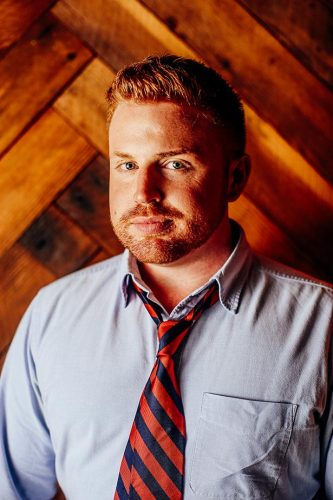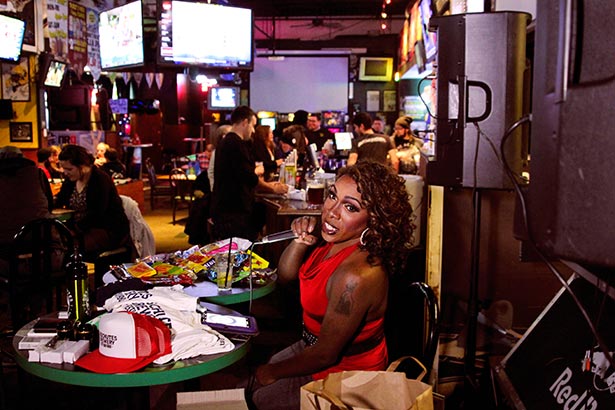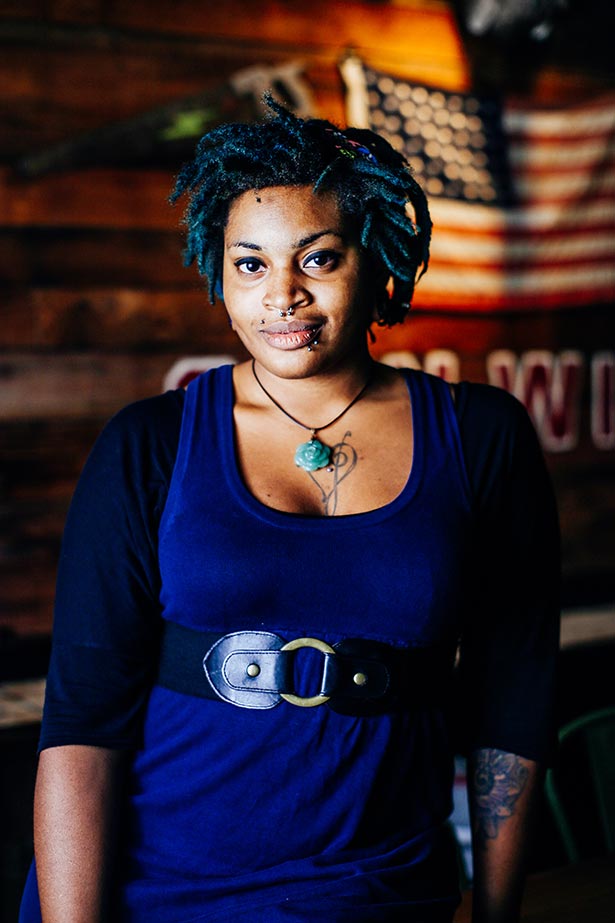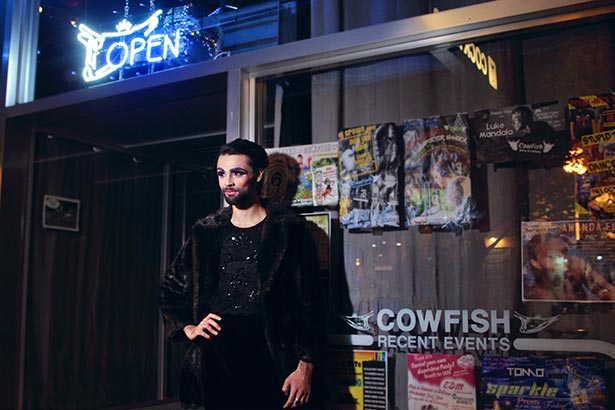
Post-punk. Post-war. Postmodern. Post-gender. Post-queer? With the repeal of Don’t Ask Don’t Tell, the recent state victories for marriage equality and a rising generation of people whose fluid identities don’t fit neatly into the he-she binary, we could be on the cusp of a post-queer moment, but that depends on whom you ask.
“You have this incredible fluidity and it’s made it really difficult to define even what that culture looks like,” says Andrew Clark, a local social worker in the LGBT community. “What’s happening is, during what we would identify as the gay and lesbian rights movement, you have very clearly defined identity categories. They were very rigid: You were a gay man; you were a lesbian; you were bisexual, you were transgender.”
Clark continues, “And that was essential to be able to coalesce the community to be able to have the necessary fights to get us where we are, but now what we see is those lines have become blurred.”
When lines blur and a community becomes nebulous, how do you define a safe space for that community? That’s a question the local LGBT community has struggled with for the past decade, or since the last local designated queer venues, Neighbors and Club Snafu, closed in 2006 and 2010 respectively.
Some say, like New York transplant John O’Malley, that Eugene is long overdue for a queer-inclusive space; he is starting a LGBT night at The Barn Light. Or Clark and fellow social worker Jasmyn Hinton, who say the local LGBT community is inaccessible and are trying to carve out a queer space.
But longtime members of the LGBT community like Anthony Barber and Cornel Hardiman wonder if a queer space is still necessary with today’s shifting attitudes. Many point to Cowfish as the de facto “gay bar,” but others, like Chicora Martin at the UO, say that “gay-friendly” spaces are no substitute for the real thing.
In this post-post world, Eugene is either behind the times or ahead of the times for not having an LGBT space. But the question remains, does Eugene need one?
Queer in the U.S.A.
According to a 2012 Gallup poll, Oregon ties for third in the nation for highest percentage of adults identifying as LGBT (4.9 percent of total population). The Advocate, one of the largest LGBT publications in the world, placed Eugene at number seven out of 15 for “Gayest Cities in America, 2013.” For a college town that continually ranks high in LGBT ratings, O’Malley finds it baffling that Eugene does not have one designated queer space. (To put that in context, Salem has two gay bars.)
O’Malley moved to Eugene this summer for his husband to pursue his doctorate. Sitting at The Barn Light on a November afternoon, O’Malley discusses the culture shock he experienced upon arrival.
That a town like Eugene “does not have a dedicated space is shocking to me,” O’Malley says. “Even if nothing happens to you as a gay, lesbian, trans or queer-identified person, there’s still fear. I’m 31 years old and I still go into spaces and feel like, am I safe in this space?”
Unsuccessful at making inroads into the gay community after several attempts, O’Malley, who has a background in theater and event production, approached the owners of The Barn Light with an idea: a monthly LGBT mixer catered to young professionals that would also be a fundraiser for LGBT organizations. (LGBT stands for lesbian, gay, bisexual and transgender. Variations also include a “Q” for either “questioning” or “queer,” an “I” for “intersex” and an “A” for “asexual,” while “queer” is more of an umbrella term for all of the above.) Barn Light owner-operators Thomas Pettus-Czar and Mark Sheppard agreed to host the event immediately.
 |
|
Karress Ann Slaughter hosts Drag Queen Bingo Thursday nights at Doc’s Pad. Photo by Athena Delene
|
“Made in the U.S.A.” was born. The state-themed event is scheduled for first Wednesdays from 6 pm to midnight with the kick-off Dec. 3 (with an Oregon theme.)
“I’ve always had this kind of pulse of being attracted to the gay community specifically because I came out so young,” says O’Malley, who came out at 15 while growing up in D.C. “I’ve always had a support network and so, kind of coming here, I realized I didn’t have a support network and this is the perfect opportunity to create one.”
Pettus-Czar and Sheppard, who identify as straight males, say they had wanted to start an event like this but didn’t want to co-opt a community. “We wanted to really develop it as a cultural venue and a base from which to make change whether it’s on a micro/macro level,” Pettus-Czar says of The Barn Light. “I felt for a long time moving here, having friends and family members of the LGBTQ community, that there wasn’t as much going on here in Eugene embracing that community as there could be. When John came to us and wanted to do this, it was sort of a no brainer.”
His Barn Light partner, Sheppard, nods in agreement. “Based on the immediate response on social networking too, on Facebook in particular, clearly there’s a need for it,” he says of the event.
A Space of One’s Own
Around the same time that O’Malley was cooking up “Made in the U.S.A.,” Jasmyn Hinton and Andrew Clark were laying the foundations for a queer space — Avalon Eugene. In fact, Hinton announced their plans in a letter to the editor in Eugene Weekly (Oct. 23) that itself was a response to an Oct. 9 letter from Dani Davis asking why there wasn’t a more active and welcoming local LGBT community.
“The feeling is mutual,” Hinton responded. “Moving here was a culture shock for me! Not one place where we could go and feel at home. But there is hope. My colleague Andrew Clark and I are working on opening an all-inclusive queer establishment in Eugene. We would provide a restaurant, bar and nightclub inside an over-arching community center.”
O’Malley read Hinton’s letter to the editor and contacted her immediately. Realizing they shared similar visions, they decided to partner; O’Malley is on the advisory board for Avalon Eugene and Avalon will be the first benefactor of “Made in the U.S.A.”
Sitting next to O’Malley in The Barn Light, Hinton and Clark say they met while working together at HIV Alliance (which has no relationship to this project) and started brainstorming ideas for a queer space a few months ago. They decided on Avalon Eugene, an umbrella organization that will hold Avalon Services — a nonprofit program focused on job skills and placement for those who have barriers to employment — and Avalon Industries, which they propose will house a restaurant, all-ages nightclub and a 21-plus bar that would be staffed with recommended job applicants from the services branch.
The reasons for opening Avalon are just as much personal as professional for Hinton and Clark.
 |
|
Jasmyn Hinton, director of operations for Avalon Eugene. Photo by Trask Bedortha.
|
“I’m from Minneapolis. Having that in my background, my recent past — I’ve been here about a year — it was a huge shock for me,” says Hinton, who identifies as queer. “It’s like everyday me thinking, what is going on? Where is the space? So I have joined a couple of queer groups; I’m in Soromundi [Lesbian Chorus of Eugene], I’m looking at maybe doing the Wild Women’s Café thing and maybe seeing if there are other groups.”
Hinton says she’s tried Drag Queen Bingo at Doc’s Pad on Thursday and GLAM, a monthly drag show at Luckey’s, but found “there’s not really a culture spot for me here and that’s something, having been used to that, it’s really, really, really difficult for me.”
“And what happens when you don’t want to go out on midnight on a Saturday?” Clark asks. “You just want to go have dinner. You want to go have a beer at 5 o’clock … and be around your community.”
From Portland originally, Clark, who identifies as gay, is at a loss. “There’s really nothing,” he says. “My actual role is HIV Alliance outreach prevention and harm reduction. I actually go to every queer-identified event in Lane and Douglas counties.” He adds, “It’s a very small group of the community that feels comfortable going to these events. Like Jasmyn was saying, there’s a really high threshold to access the community.”
Hinton and Clark are shooting for an opening date in the summer of 2015, but they are still in the process of looking for spaces and investors.
“It’s a huge gap,” Clark says of the LGBT void. “And the community has been very vocal, in this process with us at least, in terms of the need for that.”
Long Live the Queens
Bill Sullivan may know the local LGBT history better than anyone else. He too recently joined the advisory board for Avalon Eugene. Also known as Daphne Storm, his performance persona, Sullivan has been a female impersonator for more than three decades and is currently empress of The Imperial Sovereign Court of the Emerald Empire (ISCEE), the oldest LGBT nonprofit fundraising organization in Lane County, which opened in Eugene in 1974.
“I’ll be active ’til I die probably,” Sullivan says with a laugh. He sits in Townshends Tea with fellow longtime female impersonators Cornel Hardiman (Karress Ann Slaughter) and Anthony Barber (Diva-Simone Slaughter) and they reminisce about Eugene during the ’70s,’80s and ’90s when LGBT folk had to sneak though Eugene’s back alley doors to get into gay bars.
“You were taking a risk by going in the front door. People knew it was a gay bar and, back then, you’d get beat up,” Sullivan says. “I’ve been mugged in drag. I’ve been beat up, been assaulted.”
But this oppressive climate also forced the LGBT nightlife scene to coalesce and flourish, they say.
Starting in the ’70s, Sullivan says, The Riviera Room, also called the Boom Boom Room, located in what is now the Actors Cabaret of Eugene, was “the original gay bar.” The Riviera Room was joined by Cassady’s Tavern, a gay dance club on the second floor of the Eugene Hotel, when it was still a hotel. Perry’s opened in 1981, and would later become Club Arena and eventually Diablo’s (and now Ume Teriyaki Grill). Neighbors, also known as “McBar,” opened in the ’90s in an old McDonald’s on Villard Street.
The last gay bar and last home to a permanent weekly ISCEE drag show by Sullivan, Hardiman and Barber, Neighbors closed in 2006. In the following years, Club Snafu, a tiny LGBT club on Broadway, would open and close (Party Downtown now occupies the space).
Barber points out that for 30 years, they have tried to create “gay spaces and gay-positive spaces for people in town,” but that Eugene’s LGBT community is fickle, not supporting spaces already provided. “They want that mansion in the sky without putting any pennies in the bank,” Barber says.
He remembers people complaining that Neighbors was an “ex-McDonald’s” and a place like Perry’s was a “downstairs basement bar.” Or, he says, people would complain about the music or the lighting. “At one time, we had three gay bars in this town,” he says. “So now we have nothing and you get what you ask for.”
Hardiman nods. “Neighbors — people used to say they hated it,” he says. “Then the minute it was over it was whine, whine, whine.”
But Sullivan, Hardiman and Barber also saw a cultural shift start in the late ’90s.
“Now everyone’s so, you know, gay-friendly that you can do a [drag] show pretty much anywhere,” Sullivan says. He ticks off Cowfish, Jameson’s, Tiny Tavern, Doc’s Pad, Blair Alley Vintage Arcade.
“It’s great in Eugene for a college town,” says Barber, who hosts the monthly GLAM nights at Luckey’s. “People can go into any bar in town,” he pauses. “They can go into certain bars in the ‘Barmuda Triangle’ and they can dance with their partners, male or female; they can get drunk with their partners; they can make out with their partners and they’re not getting beat up, they’re not getting chased down.”
“What’s happened is the thing people want the most,” Barber continues. “We have gotten a great sense of acceptance where people go to these bars and these restaurants and people don’t get attacked for being who they are because people have integrated into all these bars in town.”
The three agree that it could only benefit the community, especially LGBT youth, to have “a place to call home,” but the same barriers to creating a successful space — engagement and money — still exist.
“It seems to me that there’s always that hope that a new space will open and someone is going to take it seriously,” Hardiman says with a sigh. “Because if we had a dollar for every time they said a gay bar was going to open …”
“We’d have one open by now,” Sullivan says. They laugh.
The cost of opening an establishment is another roadblock. Sullivan says it was much cheaper to start a place 20 years ago. “The biggest thing I see is you need someone with money to be able to do it without worrying about a profit,” Sullivan says. “Because it’s not going to make a profit the first five years at least.”
Barber agrees. “Eugene is a really, really expensive place to own a bar,” he says. Barber tried two years ago to open a bar but high rents halted the project.
Out Fishing
While the golden age of gay bars sputtered out with the closing of Neighbors in 2006, the last vestige of a designated queer space, Club Snafu, closed. This was followed not long after by John Henry’s (not a designated space but former home of GLAM). Then a slick icy-blue dance club emerged downtown that seemed to be more in line with notions of fluid sexual and gender identities.
“I just did a Google search the other day for ‘gay bar Eugene’ and we came up number one,” says Brian Hebb, co-owner of Cowfish, while sitting on a white leather couch next to the dance floor.
Hebb, who identifies as a straight man, explains they never tried to make Cowfish a gay bar; it just sort of happened. Part of that reason was location: Cowfish is across the street from where Snafu and John Henry’s once were. “Those places went away and you’re left with Cowfish.”
Cowfish is open seven days a week and is the dance club in town. On any given weekend night, throngs of twentysomethings of all backgrounds spill out onto the pavement, waiting to get carded or pulling a quick drag off a cigarette before returning to dance beneath the disco ball. Female impersonator Rhea Della-Vera hosts a monthly drag night.
 |
|
Brogan Wilkinson outside Cowfish as his drag persona Misery Mundane. Photo by Athena Delene.
|
“I also think that Cowfish is a place where the communities that are pushing the boundaries of what is considered our social contract, what [is] the legal standing we have in this country, are in Cowfish more often then they are in most places,” Hebb says. “There’s a concentration in Cowfish of trans* people, of the gay community — however you’d like to define that — mingling with the rest of society.”
But rumors have swirled that Cowfish staff are transphobic. “I don’t even know where to begin with that,” Hebb says. “All I can say is: We’re not.”
Hebb describes how when the club first opened, he consulted with the Human Rights Campaign to create an inclusive bathroom policy, a frequent obstacle for trans* people. Others have complained that LGBT night is “Freek-Nite.”
“I have heard this before too,” Hebb says, shaking his head. “Freek-Nite predates Cowfish.” He says Freek-Nite is just a costume dance party and that co-owner Shawn Mediaclast “is a firm believer in letting your freak flag fly.”
Anecdotally, it seems the Eugene community at large considers Cowfish the gay club, while many in the LGBT community say it’s only “gay-friendly,” like many other bars downtown.
“Cowfish is the spot where a lot of gay people go to, but a lot of people keep saying it’s like the gay bar and it’s actually not,” Hardiman says. “I go there every weekend, and you hear, even inside and in line, people are like, ‘I don’t want to go in there, I hear that’s a gay bar.’ It’s not really venomous but then there’s people there who are apprehensive, whether they’re gay or straight — should I go in or not go in?”
But a gay-friendly space is not the same as a gay or LGBT-designated space, no matter how fluid identities have become.
“Gay-friendly is nice,” Chicora Martin says from the LGBT office in University of Oregon’s Oregon Hall. “But not everybody who shows up at a bar knows it’s gay-friendly night.” Martin is the director of the UO’s LGBT Education Support Services Program.
“Gay-friendly just means: ‘We want you to come here and spend your money,” they say ( Martin’s preferred pronoun is “they” — many in the LGBT community choose alternative pronouns because they don’t identify with “he” or “she”). “A LGBT bar means that’s the dominant paradigm. We’ll be straight-friendly, and straight people can come here if they want, but that’s sort of the difference.”
Martin adds, a queer venue means, “We’re going to be safe in knowing that I can hit on anyone who’s here because by walking in the door, they’ve agreed to participate in the event.”
A Defining Moment
On a rainy afternoon later in November, O’Malley, Hinton and Clark are back at The Barn Light. This time they’ve brought company: Cass Averill, founder of Trans*Ponder, and Marshall Collins, vice president of LCC’s Gender and Sexuality Alliance (GSA).
Averill says he started Trans*Ponder, a monthly meet-up for trans-identified and questioning people, three years ago, and it’s been growing exponentially since.
“The queer space — I’m super excited for that,” Averill says. “With the trans community, it’s always a little interesting because it’s hard to get them to come out and be out with being out.” But, he adds, “We don’t have any sort of regular space and people certainly would love it. There’s a lot of trans people worried about safety and being out.”
Collins says events like “Made in the U.S.A.” are important. “I hear this talked about amongst my membership a lot: People are tired of just going to their friends’ houses,” he says. “That’s kind of where, in mid-sized towns like this, the LGBT community get regulated to — house parties, dinners, things like that because there is a lack of space in the community. People don’t feel welcome out in the community.”
When posed with the idea that Eugene could be reaching a post-queer moment, and perhaps the community does not need a dedicated space, the group laughs.
“I don’t want to be assimilated,” Hinton says. “That sounds like the worst possible thing.”
“How did Eugene surpass like every major city? Did I miss this?” O’Malley asks.
But spelling out what queer space is and how it will function remains half the challenge, one reason Hinton and Clark will be holding town hall meetings for Avalon Eugene in the coming months.
“There’s a need for a lot of queer spaces in town,” Martin says, looking out their office window at the students passing by. “But as a community, we have a really hard time defining that, defining what a queer space is. …We need a queer space for youth, particularly youth under 18, where they can go and have community and be safe. We need a space where our trans* community can go and meet in safety. We need a space where queer survivors of domestic violence and sexual assault can go.”
“I don’t know what that looks like,” Martin adds.
The first “Made in the U.S.A” runs 6 pm to midnight Wednesday, Dec. 3, at The Barn Light; sliding scale donation. For more information, visit wkly.ws/1um. To find out more about Avalon Eugene, visit avaloneugene.com. The GSA will be hosting its first-ever Queer Sex Symposium in January at LCC.